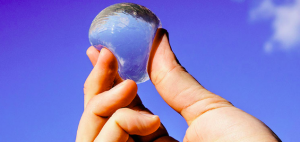The controversy over the use of plastic bottle water has been an essential issue more than decades. However, though most of people know using plastic bottle water is deleterious to our environment, unfortunately, it is still more convenient to buy and drink from a disposable container. Nevertheless, wastes generated from producing plastic water bottles are definitely over my expectation. As the picture below shows, 564 billion water bottles are consumed globally every year. And 36 ounces of water is consumed for making 12 ounces of water bottled, which means we need to use 3 times of water to produce one unit of water bottled. In addition, 340 million gallon of gasoline are used to produce those plastic water bottles.

As a result, we should look for some ways to tackle to it. The latest innovation for fighting against plastic water bottle is a water blob called Ooho!, which is a form of flexible water container, importantly, it is edible. Even though customers don’t want to eat it, they can totally throw it away since it is biodegradable. Therefore, it will not produce any waste. This amazing little water container was invented by Skipping Rocks Lab.

I think this container definitely could be the alternative for plastic water bottle, and we are able to reduce the amount of plastic water bottles annually by replacing plastic water bottle with blob. But one of my concerns is that how could Ooho! change customer’s behaviour, especially those who consider plastic water bottle is convenient and easily to carry. Also, when the girl in the video drinks water, water spills on the table and her hands. This probably would be one of the disadvantages of water blob for customers because it is not very user-friendly.
Even though the design of water bolb and way to use it still need some improvements, i think the ”container” which is made from a mixture of brown algae and calcium chloride could be applied to other beverage containers such as can, paper cup, or even for the packages of ice cream, jam and cosmetic to reduce other types of wastes.
References:
http://oceancrusaders.org/crusades/plastic-crusades/plastic-statistics/
http://www.skippingrockslab.com/

that was a great article. worth reading. you have summarized the details in very simple words. thanks for the kind information’s.